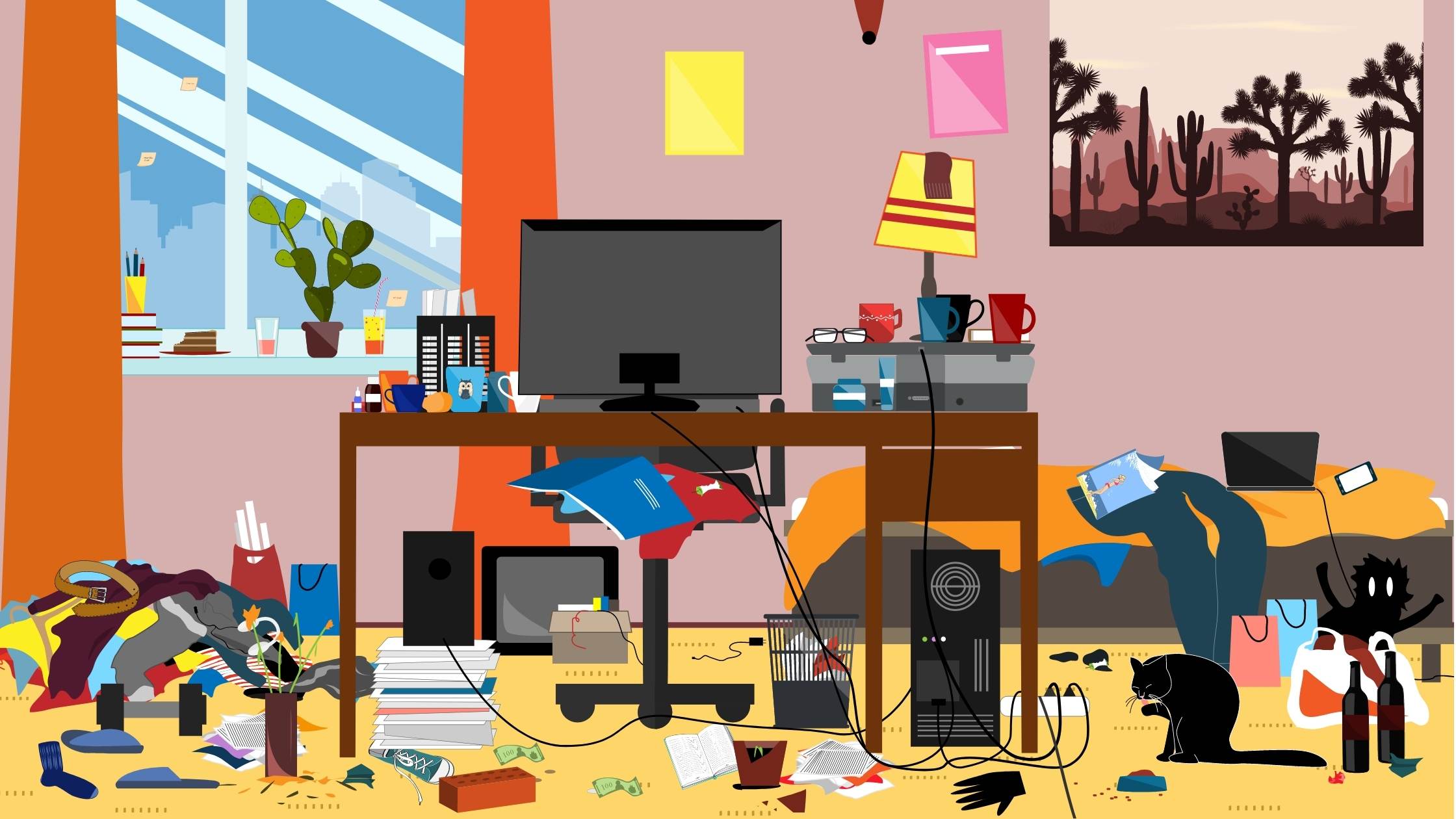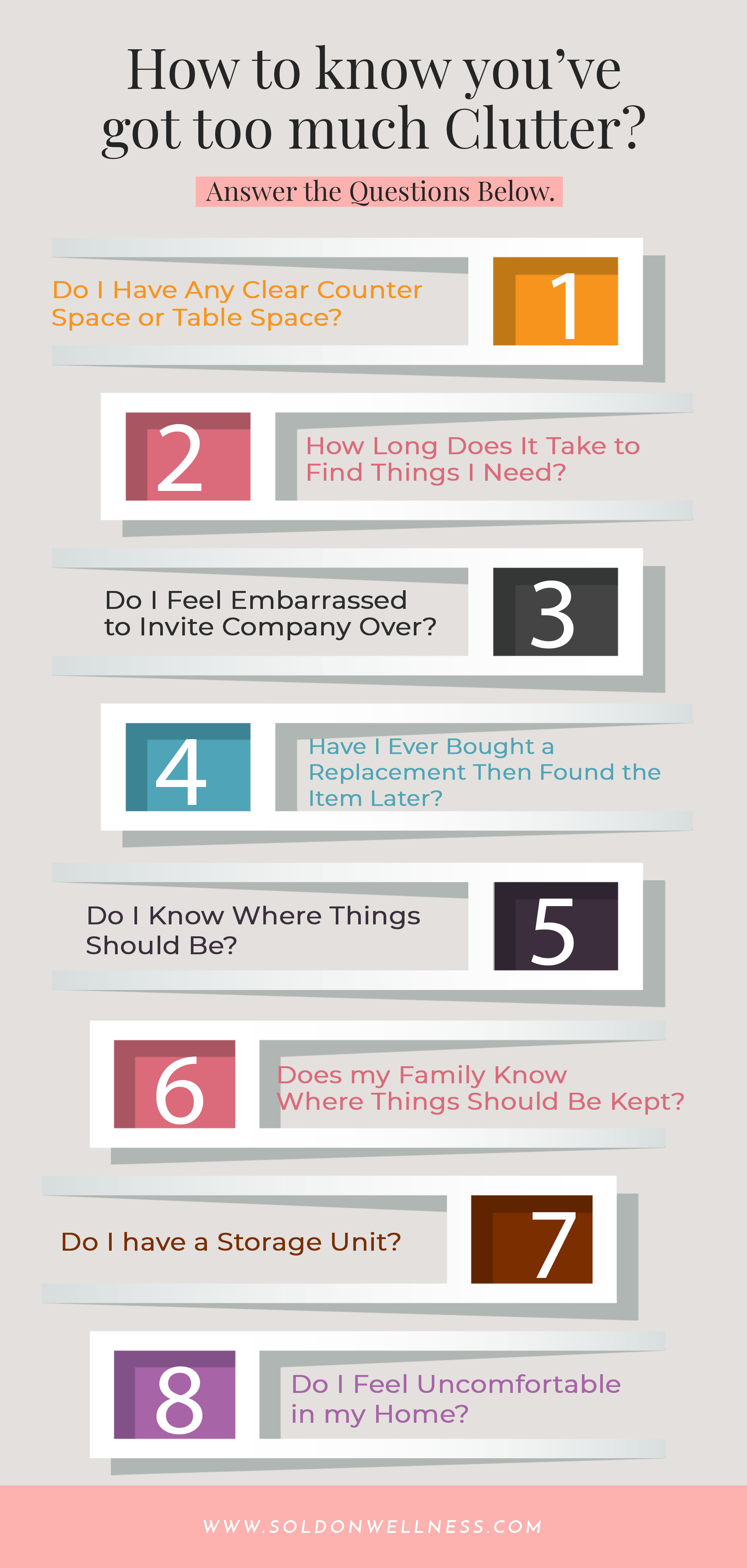How clutter affects your life will come as no surprise to anyone who's ever seen their desk or kitchen counter swell into a seemingly insurmountable obstacle. But clutter doesn't just affect our quality of life – it can have a detrimental effect on our health as well, according to a group of researchers at the University of Exeter in England, the US and Austria.
In a paper published in the journal BMC Public Health, Exeter researchers say that clutter raises stress levels, reduces the time we have for relaxation and impairs our ability to focus on tasks. The health impact of clutter is so significant that it can even lead to premature death, the paper says.
It's draining. You walk into you your home, and suddenly you get so overwhelmed emotionally and mentally. It's beginning to look like this Clutter affects your life in ways you aren't prepared for.
You are contemplating, should I scream out loud or just run to the bed and hide my head under the pillow? Quickly, you bring yourself back to reality because you know those two options won't help or hasn't in the past.
Now, what? Where do you begin to clear out this mess and Clutter that's starting to drain the energy out of you? Being an entrepreneur and a mom can sometimes make this feel so impossible to achieve.
In this article, we will look at ways Clutter affects your life, reasons why Clutter is a sign of procrastination, lack of control, disorganisation, in some way a lack of respect or value and NOT a sign of creativity or productivity.
Ways Clutter affects your life

1. Ruins Your Diet
When the house is dirty, the car is a wreck, and you're running on fumes, it's not shocking that you're not making good food choices.
It seems too hard to plan grocery shopping, cooking time, and so forth when it's all so cluttered that you cannot find your kitchen table and your oven is full of books.
2. Junk & Fast Food Seems Easy to Grab
Eating in a disorganised environment will make it more likely you grab the easiest things without a lot of thought.
There is even a book about it called "Lose the Clutter, Lose the Weight: The Six-Week Total-Life Slim Down" by Peter Walsh. It's a useful book with scientific facts to back it up.
3. Stress Hormones Make You Hungry
When you have more stress, hormones released into your blood, you end up being fatter, especially around the tummy, even without eating more.
However, you will eat more. You'll eat more due to the rise in cortisol levels.
The cortisol levels rise with stress, which also causes you to be hungrier and have more cravings due to your imbalanced sugar levels.
If you're eating fast food more than once a week and grabbing food from your kitchen without planning, you may need to reevaluate this.
4. Weakens Relationships
If you don't feel good or seem to have a constant cold, it's hard to develop good relationships. Clutter, whether it's mental Clutter or physical Clutter, can get in the way of experiencing real downtime and relaxation with the people in your life.
5. Less Intimacy with Your Spouse
If it takes all your energy to clear off the bed of junk to go to sleep, you probably won't feel much like doing anything else.
This can be bad for a marriage. Also, sleeping in a bedroom with tons of stuff all around will not be conducive to rest. Your bedroom should be a retreat for sleep and love.
6. Your Relationship with Your Kids Might Suffer
As to the rest of your family, since most days people won't be able to find their stuff and are tripping over stuff, and generally living in chaos, the mood level in the home will not be positive. The negativity will cause every relationship to suffer.
7. Causes Respiratory Issues
Knowing the adverse effects of dust mites can help you understand that Clutter carries a grave danger to the health of most individuals.
Dust mites cause allergies and illness. Some people end up feeling as if they have the flu or chronic fatigue syndrome, and all they need to do is organise and declutter their homes.
8. Dust Mites
One of the health dangers of having Clutter is the problem with dust mites. Dust mites are microscopic bugs that eat dead skin.
If you have too many dust mites in your home, you can end up being diagnosed with asthma and other health problems.
9. Other Vermin
Disorganised papers and junk attract dust and vermin. Together, these things provide good hiding places and snacks for invaders.
The pages in books, the documents in folders, as well as old newspapers and magazines attract many types of insects. If you don't want critters infesting your home, declutter it regularly.
You may not notice how much dust, dander, and dirt you have until you start cleaning.
If it's been a few months (or years) since you've cleaned your home or office thoroughly, you probably should wear a protective mask.
Allergies, asthma, and other illnesses like this are prevalent in houses full of Clutter.
10. Increases Mental Problems
According to Psychology Today. "Messy homes and workspaces leave us feeling anxious, helpless, and overwhelmed,"
The Clutter and disorganisation around you can ruin your focus. It becomes hard to concentrate with the mess around. They just have a way of interrupting your flow.
There is scientific discovery around the association between Clutter and mental health. Hopefully, this means that there may be a cure.
11. Anxiety Inducing
Worry, anxiety, circular thoughts are all increased when surrounded by Clutter.
Then the reality of 'fixing' things plus many other things going through your mind (classified as mind clutter) is enough to cause so much overwhelm.
The other thing is that Clutter is closely tied to an inability to let go of the past. If you're finding that you're obsessive about the past, it manifests in the inability to get rid of things.
You may not even be storing the thing right that you want to keep. If you look to the past as the "best of times," this may explain your inability to get rid of Clutter.
12. Increases The Risk of Becoming a Hoarder
While not all people who have Clutter become hoarders, it can happen.
If you have Clutter, but it's not blocking your walkway, and you have some clean surfaces, can you take a bath without removing the garbage? Then you may be safe from being a hoarder.
But, if you are starting to cross the line, you may want to get some help.
People with lots of physical Clutter also have lots of Clutter mentally. This can make life, in general, feel messy and out of control.
Usually, when they fix the Clutter, their outlook improves, and the mind becomes clearer.
The only way we can know that something is wrong is to be honest with how we feel mentally and physically in our current living situation.
13. Encourages Bad Money Management
Clutter can cause so much destruction if you're not careful. You can even end up with bad credit.
You will end up spending more money on replacing "lost" items or buying something you already own because you forgot that you own it since you cannot find it.
Besides, you may end up paying a lot of late fees.
14. Surprise Bills
In most cases, a surprise bill will be something like an unexpected expense because something broke down or because you got sick, not because you just forgot to pay the water bill.
If you always forget that specific bills are due, it can be very costly to you.
15. Not Balancing Your Bank Account
If there is so much clutter in your mind and space that you cannot keep track of time, it's likely that you're also not balancing your bank account regularly.
It's not as hard now with online banking, but you should not trust yourself to remember or for the bank to deduct your expenditures in order.
16. Paying Late Fees & Higher Interest
When you pay a bill late, it's going to carry a late fee. These can add up. Another bad thing about paying late fees on one bill is that the interest rate you pay may go up on all your other bills too.
Also, it'll be harder to establish credit for renting a place to live or getting a small business loan.
As you can see, being cluttered can impact your financial health in a big way. Being cluttered can cause you to be poor at money management.
You may not have any idea how much money you have or use in any given week or month if you aren't organised enough.
Deeper Dive:
Habits You Need for Success as a Female Entrepreneur
10 Achievable Habits you can Create to Stop Overthinking
9 Simple Habits That Can Help You Achieve More With Less Stress
How to Achieve More By Filling Your Active Time With Things You Love
17. Impacts Safety & Wellness
Clutter can put us in risky situations such as:
Falling Risk
One problem with having things in your path is the risk of falling. One of the saddest and most preventable injuries among the elderly and those who live alone is falling.
Most falling can be prevented if you keep the paths clear and clutter-free. Even a few papers in the wrong spot can cause a person to slip and fall.
Fire Hazard
Collections of papers stored in rooms, attics, and crawl spaces can create severe fire hazards. It doesn't take much to start a fire when you have a cluttered environment.
Newspapers, magazines, and old bills dry out as they age, which makes them even more combustible.
Not only that, if there is a fire, burning materials break away and may make escaping a fire difficult or impossible.
Pest Invasion
When you have too much Clutter that keeps you from dealing with messes for years, you risk a severe invasion of pests.
Cockroaches, silverfish, termites, and ants are particularly attracted to wood-based items and paper.
Mice and rats love a cluttered environment with plenty of nesting materials to use. Once you have insects coming in, you also run the risk of having larger animals visiting feast on the banquet of insects available.
Mould Growth
You won't always see mould if you aren't regularly cleaning the areas it could develop.
Where your AC lives, where your water heater lives, under the kitchen sink, bathroom skins, toilets, tubs, showers, near your water dispenser – anywhere there is water at risk for mould growth without regular cleaning sessions.
Some types of mould are severe and dangerous health threats for some individuals because they can cause mental and physical health issues.
18. Decreases Productivity
If you have to do an hour of reorganising to get something done, the Clutter will contribute to procrastination because of the time you have to waste to get to the things you want to do.
The time that is lost trying to "get ready" or prepare for anything is frustrating and causes your productivity level to dwindle to nothing.
19. Inability to Meet Deadlines
If you cannot find things, your work is unorganised, you didn't name files right, you didn't file things right, and you misplaced important paperwork and so forth, it can be hard to meet your deadlines. If you cannot meet deadlines, it can adversely affect your career.
20. Lack of Motivation
Even just walking in a room and seeing the Clutter can be demotivating. You see all the stuff even if you don't realise it.
All these things bombard your mind and cause confusion. The papers, the dirt, the items stacked on top of other stuff are not conducive to success.
21. Serious Distraction
Every time you blow your nose due to the dust, and every time you have to toss things from one spot to another so you can do something, you're going to end up distracted and not working at your best.
Everyone has the same hours in a day, but it's easy to get overwhelmed when you've allowed your home and or office or anyplace you must get things done to get so cluttered.
Clutter can drag you down and make you feel like giving up.
22. Clutter Is Bad for The Environment
One of the main culprits of Clutter is overconsumption. People have garages so full of stuff that they don't use that they cannot put their cars inside.
This type of Clutter is not only making you sick it's making the earth sick. Everything we make, especially the things found in a cluttered home, such as unworn clothing, magazines, and furniture, pollute the environment when they are created.
Cutting down on Clutter not only helps you improve every aspect of your life, but it enables you to improve the environment.
Once you clean up, commit not to add to the Clutter anymore. Choose to bring only essential things into your home and only keep items that you use.
If you aren't using something on a semi-regular schedule, consider selling or giving it to someone who will get more use out of the item.
As you can see, Clutter in your environment has adverse effects on every aspect of your life. It affects your mental health and your physical safety when it decreases productivity, stresses relationships, and hurts your financial future.
It even affects the physical environment due to inadequate or inaccurate decision-making and overconsumption.

Final Thoughts on How Clutter Affects Your Life
I'll conclude by saying you can live a Clutter-free life, and there's no shame in having a tiny bit of Clutter in your home (the kind that gets fixed with less stress).
However, taking conscious steps in simplifying your living space and being mindful of ways Clutter affects your life as a busy mom can help create a positive impact on your health and wellbeing.





